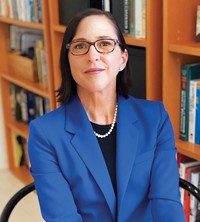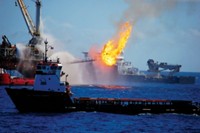Advertisement
Grab your lab coat. Let's get started
Welcome!
Welcome!
Create an account below to get 6 C&EN articles per month, receive newsletters and more - all free.
It seems this is your first time logging in online. Please enter the following information to continue.
As an ACS member you automatically get access to this site. All we need is few more details to create your reading experience.
Not you? Sign in with a different account.
Not you? Sign in with a different account.
ERROR 1
ERROR 1
ERROR 2
ERROR 2
ERROR 2
ERROR 2
ERROR 2
Password and Confirm password must match.
If you have an ACS member number, please enter it here so we can link this account to your membership. (optional)
ERROR 2
ACS values your privacy. By submitting your information, you are gaining access to C&EN and subscribing to our weekly newsletter. We use the information you provide to make your reading experience better, and we will never sell your data to third party members.
Safety
U.S. Chemical Safety Board faces death sentence
Trump’s plan to kill investigation panel could leave industry without a key tool to reduce risk
by Jeff Johnson, special to C&EN
May 22, 2017
| A version of this story appeared in
Volume 95, Issue 21

The future of the U.S. Chemical Safety & Hazard Investigation Board is in doubt now that President Donald J. Trump is proposing to abolish the small agency.
CSB is the world’s only independent body dedicated to investigating chemical-related industrial accidents to find their root causes and, in hopes of preventing similar incidents, pass this information on to companies, regulators, workers, and communities.
Trump’s plan to eliminate CSB by defunding it, announced in March, has generated an outpouring of support for the board. The backing comes mainly from residents living near large U.S. industrial plants and refineries, unions, local officials, and safety experts. Several companies that have been investigated by CSB as well as the American Chemistry Council, a chemical industry trade association, are tight-lipped and reluctant to comment on the impact of the proposed elimination of the board.
Ultimately, the fate of CSB will turn on whether Congress decides to provide funding for it. The board took on several of its most significant investigations, including into the 2010 BP Deepwater Horizon oil disaster, at the behest of lawmakers. Members of Congress have not yet indicated whether they will support CSB’s continued existence. Lawmakers funded CSB for $11 million this year.
The proposal to shut down CSB is part of Trump’s blueprint to slash nonmilitary federal spending for fiscal year 2018, which starts on Oct. 1. The reductions are needed, the President says, to increase defense spending by $54 billion and build a U.S.-Mexico border wall.
Trump’s proposal to defund the board surprised CSB Chair Vanessa Allen Sutherland. As in previous years, she expected the board to have to fight for annual funding when she was called to the White House Office of Management & Budget in mid-March, Sutherland says. This year, however, she was told CSB would be eliminated, with its funding pruned in fiscal 2018 to a minimal level needed to shut it down.
Defunding CSB would return the U.S. to a time in which there was little, if any, federal investigation into major industrial accidents.
CSB was created through a provision in the most recent major legislative overhaul of the Clean Air Act, which took place in 1990. Controversial from the beginning, CSB was opposed by then-President George H. W. Bush because of its independence, according to a statement he released when signing the legislation.
Former president Bill Clinton also did not support the board. Instead, Clinton directed the Environmental Protection Agency and the Occupational Safety & Health Administration to investigate accidents.
As incidents continued, the two agencies fell far behind in their probes. The agencies had little incentive to investigate because they were likely to be partially at fault because of a lack of enforcement of existing regulations, says Gerald Poje, one of the first CSB board members.
An April 1995 explosion and fire at Napp Technologies in Lodi, N.J., changed the situation, Poje says. The accident killed five workers and destroyed most of the facility and surrounding businesses.
The blast was just a few kilometers from the home of Sen. Frank R. Lautenberg (D-N.J.), who had been instrumental in inserting the CSB provisions in the Clean Air Act. When OSHA’s and EPA’s investigation of the disaster stalled, pressure from Lautenberg, unions, community groups, the New Jersey governor, and others led Clinton to support funding CSB.
In response to Clinton’s request, Congress appropriated $4 million, and in January 1998, CSB opened its doors.
CSB’s annual budget has never exceeded $12 million, which is one-tenth of that of the National Transportation Safety Board, which investigates transportation accidents and on which CSB is modeled.
Despite its small budget, CSB has investigated some 130 accidents and produced more than 90 accident reports and some 40 safety videos based on specific accidents. It has influenced industrial and chemical safety in the U.S. and across the world through its recommendations, according to industrial accident experts contacted by C&EN.
For instance, the U.K. Health & Safety Executive (HSE) that regulates industry in Britain uses insights and findings from CSB investigations to back up its regulations, says Ian Whewell, former HSE director of offshore safety.
“We all must learn the lessons of the past,” he says. “Without CSB carrying out independent, nonjudgmental investigations, U.S. chemical and petrochemical industries would be without one of the key tools they need to reduce the risk of catastrophic accidents.”
Poje agrees.
“Trump’s proposal is unwise,” he states. “The next major incident in 2017 will prompt a catalytic change in thinking about CSB. Its budget is tiny, far less than the property loss from a single industry accident.”
He adds, “CSB is a bargain for helping protect the homeland, save lives, and better ensure continuity of businesses.”
Jeff Johnson is a freelance writer based in Washington, D.C.





Join the conversation
Contact the reporter
Submit a Letter to the Editor for publication
Engage with us on Twitter